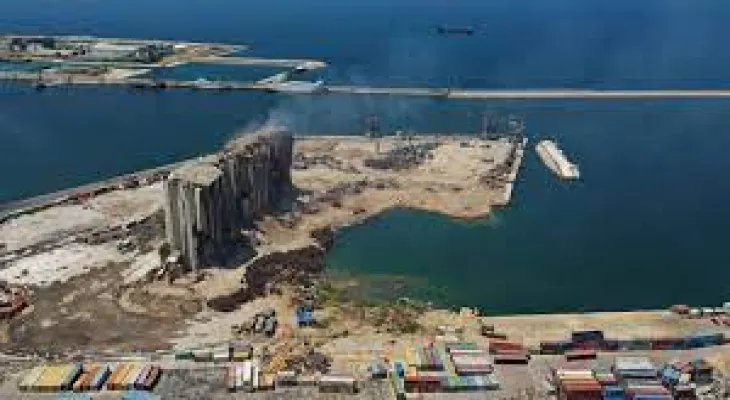Search here
Newspaper
Search here

Arab Canada News
News

Published: August 1, 2022
A cracked part of the Habibeh storage silos at Beirut port fell on Sunday after repeated fires broke out in it, days before Lebanon commemorates the second anniversary of the devastating explosion, according to reporters for Agence France-Presse.
Immediately after the collapse of the cracked part, thick dust covered the atmosphere of Beirut port.
Minister of Public Works and Transport Ali Hamie told Agence France-Presse that "two silos have fallen so far, and there is a possibility that two others will fall." He pointed out that two other silos have separated "even more" from the structure completely.
This comes two weeks after a fire broke out in the northern section of the silos caused, according to authorities and experts, by the fermentation of the grain stock with the rise of temperatures and humidity levels.
After the collapse of the two silos, the army helicopters continued their work spraying water over the silos, from which a small amount of smoke still rises.
Lebanese authorities warned days ago that the northern cracked part due to the explosion is exposed to the "risk of falling." The silos have become a symbol of the Beirut port explosion, which caused the death of more than two hundred people and injured more than 6,500 others on August 4, 2020.
The silos, which are 48 meters high and could hold 120,000 tons of grain, absorbed the bulk of the destructive blast to thus protect the western part of the capital from similar destruction that affected its eastern part, according to experts.
According to the Ministry of Environment, the southern silos remain stable with no recorded motion threatening their safety.
Some silos contain about three thousand tons of wheat and grains that could not be unloaded due to the danger of working near them, fearing that this might accelerate "the movement of the already cracked silos structure and the collapse of large parts of it," according to the authorities.
The Ministries of Environment and Public Health issued preventive guidelines at the beginning of the week regarding dust emissions consisting of construction debris and some fungi from rotten grains in case the northern silos fall.
The guidelines included the immediate evacuation of the port, wearing highly effective masks, closing doors and windows in the area surrounding the port for 24 hours while wearing masks outside.
In April, the government made a decision to demolish the silos due to public safety concerns, but it suspended its implementation following objections submitted by civil groups and the committee of families of the port explosion victims demanding that the silos be transformed into a memorial landmark of the explosion.
Cecile Roukoz, who lost her brother in the explosion and rushed to the port after the collapse of the two silos, said, "I cried when I learned about it."
She added to Agence France-Presse, "We want a part of the silos to remain a witness to the crime, as a collective memory of the city, and to commemorate those who died for no reason."
The explosion resulted, according to authorities, from storing huge quantities of ammonium nitrate inside the port without preventive measures after a fire of unknown cause broke out. It was later revealed that officials at various levels were aware of the risks of storing the material and did nothing.
The judicial investigations, which have been suspended for months, have made no progress, given political interference and lawsuits against the judicial investigator Judge Tarek Bitar, filed successively by several defendants including current deputies and former ministers.
Comments